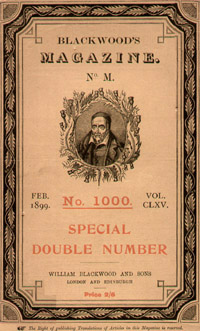 Blackwood's Magazine (Edinburgh, UK)
Blackwood's Magazine (Edinburgh, UK)
- Karain; A Memory (Nov 1897)
- Youth (Sep 1898)
- The Heart of Darkness (Feb 1899 — Apr 1899)
- Lord Jim; A Sketch (Oct 1899 — Nov 1900)
- The End of the Tether (Jul 1902 — Dec 1902)
- Her Captivity (Sep 1905)
- Initiation: A Discourse Concerning the "Name" of Ships and the Character of the Sea (Jan 1906)

February 1899
Blackwood's arguably played a greater role than any other magazine in Conrad's literary career. His writing was actively promoted by the house's reader David S. Meldrum, and he enjoyed the confidence of William Blackwood, the founder's grandson, who also published Lord Jim and Youth as books. Blackwood's cultural prestige, Tory nationalism, and global circulation were key factors in establishing Conrad's credentials as an English writer. As he remarked in 1900: 'Lord Jim brings me letters. From Spain to day! They take in Maga in Madrid. Where is it they don't take Maga!' (CL 2:272).
Tales of military and colonial life were popular among readers of Blackwood's, and at the turn of the century its roster of contributors in these categories included Lionel James (pseud. 'The Intelligence Officer'), Ernest Dawson, John Buchan, Hugh Clifford, and George Warrington Steevens. All of the stories by Conrad which appeared in Blackwood's between 1897 and 1902 have a colonial setting, as do the other works which he unsuccessfully tried to place there: 'Falk', 'Typhoon', and an early version of 'The Shadow-Line'.
'To appear in P[all] M[all] M[agazine] and the Ill[ustrated] Lond[on] News is advantageous no doubt', Conrad wrote to David Meldrum in 1902, 'but I only care for Maga, my first and only Love!' (CL 2:368). For all their obvious flattery, statements like these gave voice to Conrad's genuine affection for what he saw as a traditional periodical that, in an era of cultural debasement, had continued to put literary quality above commercial appeal. 'It is an unspeakable relief to write for Maga instead of for "the market" -- confound it and all its snippetty works', he declared extravagantly to George Blackwood: 'I had much rather work for Maga and the House than for the 'market': were the 'market' stuffed with solid gold throughout' (2:375, 376). A regular reader of Blackwood's -- 'the only monthly I care to read' (CL 2:129) -- he identified closely with its conservatism in politics and culture. 'I do like the attitude of the Maga on the Spanish business', he told a correspondent during the Spanish-American War of 1898 (CL 2:81), and confessed ironically after the magazine changed its typeface: 'One misses the familiar aspect of the pages when opening the familiar cover. I am "plus royaliste que le roi" -- more conservative than Maga' (CL 2:81, 162).
The high point of Conrad's involvement with Blackwood's came in 1899 when William Blackwood invited him to contribute a story to the magazine's thousandth number. In this special double issue for February 1899, priced 2/6, Conrad's contribution -- the first installment of 'Heart of Darkness' -- appeared alongside Hugh Clifford's 'A Daughter of the Muhammadans', sentimental romances ('Madonna of the Peach-Tree' and 'The Sword of Corporal Lacoste'), articles on Jamaica and Russia, and an appreciation of Arthur Rimbaud titled 'A Vagabond Poet' by the ultraconservative critic Charles Whibley.
Although Conrad's unwelcome requests for advances, failure to supply copy on time, and hiring of the literary agent James Pinker resulted in a cooling of his friendship with the Blackwoods, the publication of two short essays in Blackwood's in 1905-1906 may have given him hopes of reestablishing the relationship; in April 1906, he submitted 'The Brute' to William Blackwood for consideration. Alas, the story, which went on to become one of Conrad's most widely reprinted magazine tales, was rejected by Blackwood as insufficiently original. Nevertheless, Conrad was to look back fondly upon his involvement with the magazine that 'took my name wherever the English language is read': 'One was in decent company there and had a good sort of public. There isn't a single club and messroom and man-of-war in the British Seas and Dominions which hasn't its copy of Maga' (4:49, 506).
Sources
Blackburn, William. 'Conrad and William Blackwood'. In Joseph Conrad: Letters to William Blackwood and David S. Meldrum. Durham: Duke University Press, 1958. xiii-xxxiii.
Blackwood's Magazine. Wikipedia.
Davies, Laurence, et al., ed. The Collected Letters of Joseph Conrad. Cambridge: Cambridge University Press, 1983-2007. 9 vols.
Finkelstein, David. Blackwood's Magazine Homepage.
Finkelstein, David. 'Decent Company: Conrad, Blackwood's and the Literary Marketplace'. Conrad and Serialization. Ed. Stephen Donovan, Linda Dryden, and Robert Hampson. Special edition of Conradiana, forthcoming 2008.
Finkelstein, David. The House of Blackwood: Author-Publisher Relations in the Victorian Era. University Park: Pennsylvania State University Press, 2002.
Finkelstein, David. An Index to Blackwood's Magazine, 1901-1980. Aldershot: Scolar Press, 1995.
Finkelstein, David. '"Long and Intimate Connections": Constructing a Scottish Identity for Blackwood's Magazine'. Nineteenth-Century Media and the Construction of Identities. Ed. Laurel Brake, Bill Bell, and David Finkelstein. Basingstoke: Palgrave, 2000. 326-338.
Finkelstein, David, ed. Print Culture and the Blackwood Tradition, 1805-1930. Toronto: University of Toronto Press, 2006.
Fraser, Gail. 'The Short Fiction'. The Cambridge Companion to Joseph Conrad. Ed. J. H. Stape. Cambridge: Cambridge University Press, 1996. 25-44.
Robert Hampson, 'Conrad and the Idea of Empire', L'Epoque conradienne (1989): 9-22.
Tredrey, F. D. House of Blackwood, 1804-1954: The History of a Publishing Firm. Edinburgh: Blackwood and Sons, 1954.
Vidan, Ivo. 'Conrad in his Blackwood's Context: An Essay in Applied Reception Theory'. The Ugo Mursia Memorial Lectures. Ed. Mario Curreli. Milan: Mursia International, 1988. 399-422.
Willy, Todd G. 'The Call to Imperialism in Conrad's "Youth": A Historical Reconstruction'. Journal of Modern Literature 8 (1980): 39-50.
Oxford University's Bodleian Library has page images of Blackwood's for the years 1843-1863. Click here.
A transcription of volumes 1843-1847 of Blackwood's is available at Project Gutenberg. Click here.